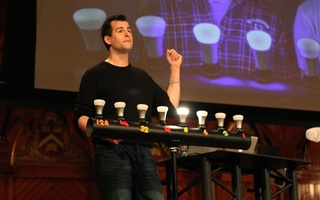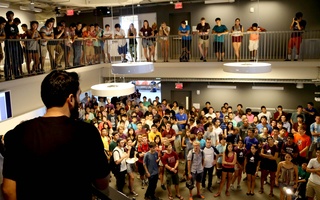UPDATED: February 9, 2016, at 9:16 a.m.
In the past few years, CS50 instructor David J. Malan ’99 and the University have filed contradictory applications to trademark the course, a set of public documents indicate. Public records also indicate that Malan formed a now-dissolved “education consulting” business called “CS50 LLC” in 2011.
One of the largest courses at Harvard, CS50—an introductory computer science class with a massive online audience and satellite operations at Yale—has generated both excitement and controversy since Malan took the helm in 2007. During Malan’s time as head instructor, the course has boasted consistently high marks in student evaluations and garnered praise from faculty and administrators. Some students, however, have criticized the course’s corporate sponsorship and large, enthusiastic following. {shortcode-003d603136b2721ba82c36ad1c7aeb13da56d6f5}
Between 2011 and 2012, Malan—who did not respond to repeated phone calls and email requests for comment—filed at least four applications to trademark “CS50” and “THIS IS CS50,” a recognizable tagline for the course. The applications were filed with the U.S. Trademark and Patent Office; In the original application, “CS50” was first described as “educational and entertainment services,” including class material and lectures, as well as “education consulting related thereto.”
In September 2011, five months after submitting his first trademark applications, Malan filed a certificate of organization with the Massachusetts Secretary of the Commonwealth for “CS50 LLC,” a limited liability company.
Malan’s two initial applications stalled after the trademark office processing his requests sent him multiple rounds of necessary revisions.
According to Rebecca L. Tushnet ’95, a trademark expert at Georgetown Law School, barriers often arise when an applicant applies for a trademark without an attorney; none of Malan’s applications lists an attorney. In September 2012, Malan submitted another, separate round of applications for “CS50” and “THIS IS CS50,” which were routed to a different law office at the Trademark and Patent Office.
In early November 2012, Malan’s original application for the “CS50” trademark was published for opposition in the “Trademark Official Gazette” on Nov. 6, 2012, which begins a 30-day period that provides anyone the opportunity to file opposition to the registration. On Nov. 27, the application for “THIS IS CS50” was published.
Three days before the end of the opposition period for “CS50,” however, Harvard— through outside attorney Thomas L. Holt— filed a successful request to extend the opposition period on both applications. Harvard had until March 6, 2013, to file formal opposition to the “CS50” application and until March 27 for “THIS IS CS50.”
Had Harvard not intervened, the trademark likely would have proceeded to the final stages of the registration process.
On Feb. 19, 2013—before Harvard filed any formal opposition to the trademarks—Malan filed to “abandon” all of his active trademark applications, according to the U.S. Trademark and Patent Office’s website. {shortcode-aa9f2e7144c334a8b7d25de27465194883cd777c}
He also did not file mandatory annual reports for CS50 LLC after 2012, which led to its dissolution by the Secretary of the Commonwealth in June 2015, according to the office. On March 1, 2013, 10 days after abandoning his trademark applications, Malan filed a certificate of organization for “50 LLC,” listing the same address as CS50 LLC, and describing the “general character of the business” as “commercial and educational software, hardware, content, and services.”
50 LLC remains a registered limited liability company with the Secretary of the Commonwealth’s office. According to the office, the company is in danger of dissolution because it has not filed an annual report since its founding in 2013.
Tushnet, the trademark expert, said that from an outsider’s perspective, the LLC and trademark documentation indicate that Malan may have been interested in creating a CS50 “franchise.” Malan did not respond to requests for comment on Tushnet’s analysis.
Faculty of Arts and Sciences spokesperson Anna Cowenhoven, sitting in on an interview with FAS Dean Michael D. Smith, deferred for the most part to Malan and Harvard’s trademark office for comment, although Smith said Malan updates him regularly.
“[Malan] keeps me well-informed about what's he's doing to make sure he doesn't misstep. He talks to the appropriate people,” Smith said. “He's worked with [the] trademark office to make sure we do things appropriately in that space.”
Copyright expert and Law School professor Jeannie C. Y. Suk said the public records do not provide a full picture. {shortcode-a9c8ca7bd1e077475e1d60b68f86298541a36ad1}
“My reading suggests the issues are more complicated than they at first appeared,” Suk wrote in an email.
At the end of the fall semester, meanwhile, Harvard submitted applications to trademark both “CS50” and “CS50x,” the course’s online arm distributed through edX, a Harvard-MIT online education non-profit. Harvard’s trademark application for CS50 includes screen captures of CS50’s course website as well as course materials.
According to Harvard spokesperson David J. Cameron, the applications were filed in part to “protect from potential misuse” because of the course’s “broad online presence.”
Cameron declined to discuss Malan’s previous trademark applications, Harvard’s successful extension of the opposition period, CS50 and 50 LLCs, or who in the Harvard administration made the decision to pursue the trademark. Holt, the lawyer who filed Harvard’s request for extension of the trademark applications’ opposition period, said he was “not authorized” to comment.
While CS50 is the only individual course on Harvard’s “non-exhaustive” list of registered or pending trademarks, Tushnet said that “Harvard is notoriously highly protective of its trademarks and related intellectual property.”
According to Tushnet, the law usually favors universities over the course instructors if a dispute arises over intellectual property.
Harvard’s policy on intellectual property states that “The University shall own all patents, copyrights and other intellectual property rights in Sponsored Computer Software.”
—Staff writer C. Ramsey Fahs can be reached at ramsey.fahs@thecrimson.com. Follow him on Twitter @ramseyfahs.
Read more in University News
Law Review Elects 130th PresidentRecommended Articles
-
The CS50 ModelCS50 is not a fluke. The methods that turned the course into an academic juggernaut with top Q ratings and astronomical enrollment figures—in spite of ostensibly abstruse subject matter and an infamously taxing workload—can be applied across the Harvard curriculum.
-
 Malan and Harvard Need Couple's Therapy
Malan and Harvard Need Couple's Therapy -
Courses Are Not CorporationsIn recent years, professor David J. Malan '99 attempted to trademark aspects of the CS50 brand. Aspirations of franchising a course run counter to a professor's duty as an instructor of a Harvard course.
-
 Harvard Hits Roadblock in CS50 Trademark Applications
Harvard Hits Roadblock in CS50 Trademark Applications -
 In ‘Unusual’ Timeline, Honor Council Review of CS50 Cases Lasted Through February
In ‘Unusual’ Timeline, Honor Council Review of CS50 Cases Lasted Through February













